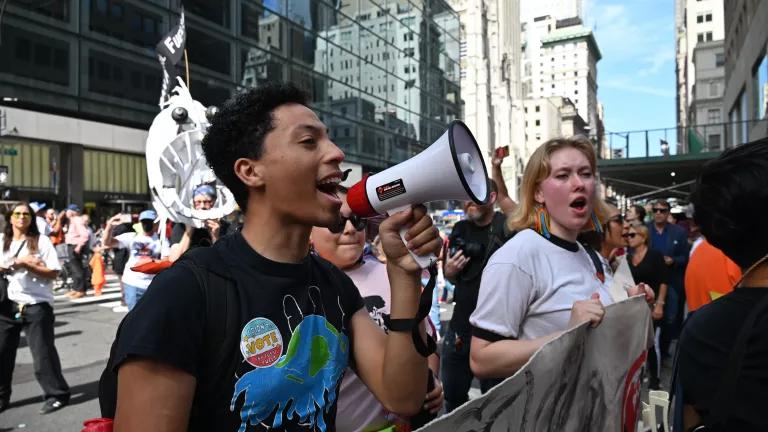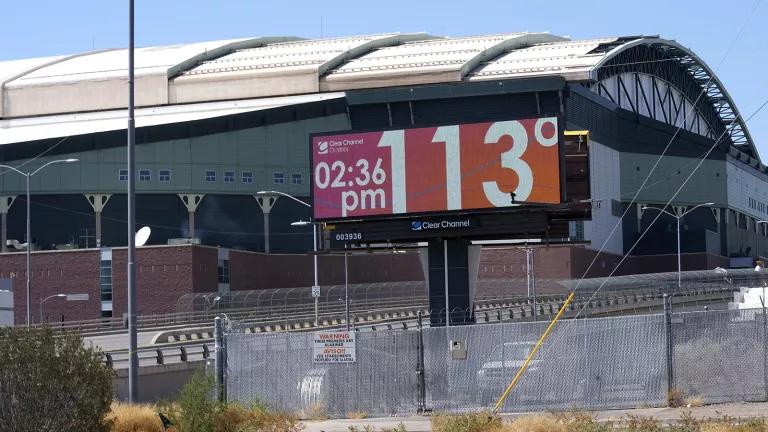Michael Bloomberg Wants to Help Cities Keep the Promise of the Paris Agreement
The former New York City mayor’s American Cities Climate Challenge is a $70 million effort that will help 20 of the nation’s biggest cities achieve their climate goals.

The Manhattan skyline
The former New York City mayor’s American Cities Climate Challenge is a $70 million effort that will help 20 of the nation’s biggest cities achieve their climate goals.
June marks a year since President Trump vowed to withdraw U.S. participation from the 2015 Paris climate agreement, part of what he calls his “America first” approach to international relations. “America alone” is more like it. We’re now the only country in the world that isn’t a party to the accord. Isolating ourselves from global opportunity is hardly putting U.S. interests first.
Fortunately, leaders across the country have rejected Trump’s call to walk away from the promise of Paris, go back on our word to the rest of the world, and leave our children to pay the price. Just 18 percent of the public supports Trump’s reckless and wrongheaded move.
At the regional, state, and local levels, thousands of civic and business leaders are part of an effort called America’s Pledge, which is driving the clean energy advances we need to protect future generations from the growing dangers of climate change. Across the country, a bipartisan group of governors from 17 states and Puerto Rico, representing almost 40 percent of the U.S. population, have banded together to form the U.S. Climate Alliance, pledging to meet or surpass their share of Paris Agreement carbon reductions. And more than 450 mayors have joined We’re Still In, a commitment to do their part to advance the goals of the Paris accord.
Now, in a newly announced initiative, former New York City mayor Michael Bloomberg is giving this urban movement a boost. He’s asked mayors from the 100 most populous cities in the country to share their plans for making their buildings and transportation systems run cleaner and more efficiently. The 20 that show the greatest potential for cutting the dangerous carbon pollution that’s driving climate change will share a total of $70 million in technical assistance funding provided by Bloomberg Philanthropies and partners.
The cities selected will be able to use the money for things like consulting with transportation and building experts; hiring professional help to design, plan, and implement programs to improve building efficiency and affordable public transit; training key city officials; and enhancing civic engagement to make sure clean energy strategies reflect local priorities.

The United Nations Secretary-General’s Special Envoy for Climate Action Michael R. Bloomberg
The initiative, called the Bloomberg American Cities Climate Challenge, will go a long way toward helping cities achieve their climate goals. It’s also a vote of confidence in the ability of leaders to have real impact at the city level.
That’s important. As centers of population and economic activity, cities account for more than two-thirds of energy use, worldwide, and more than 70 percent of the climate-disrupting carbon pollution that comes from burning fossil fuels. In urban centers like New York City, buildings and transportation can account for 90 percent or more of the carbon pollution. We need to address those sources if we’re going to protect our children from the growing dangers of climate change. With the help of city and state leaders nationwide, that’s exactly what we’re doing.
Since 2005, we’ve cut our national carbon footprint by 14.2 percent while our economy has grown by 21 percent. That’s real growth, after adjusting for inflation. How have we made our economy stronger and cleaner? We’ve put more than three million Americans on the job―helping us to become more efficient so we do more with less waste, helping us to build some of the best all-electric and hybrid cars anywhere in the world, and helping us get more clean, homegrown American power from the wind and sun.
With continued bold action backed by sound policies, we can cut our carbon footprint in the United States 80 percent by 2050.
No one expects our cities to get the job done by themselves. It’s going to require determined efforts and policy coordination among local, state, and federal governments to support continued private investment.
In case after case, though, our cities and states are demonstrating what can be accomplished when innovation and investment join hands with political will.
- In Chicago, a new energy benchmarking ordinance has helped the owners of nearly 2,800 properties improve energy efficiency by 8 percent, on average, since just 2016, saving an estimated $14 million a year in utility bills and supporting some 900 jobs.
- Atlanta is promoting the use of electric cars through its 2017 EV Ready city ordinance, which will make it easier to recharge such vehicles at new homes and public parking lots.
- In Minneapolis and St. Paul, a new light-rail system connects the central business districts of the Twin Cities to the University of Minnesota―putting affordable public transit within a half-mile of more than 170,000 households, easing congestion, and reducing fossil fuel pollution.
- Los Angeles recently expanded its BlueLA electric car-sharing service to improve access for low-income communities, putting clean transit options within reach for legions of workers.
These and countless other programs are helping our cities contribute to a national effort to meet a global goal: shifting away from the fossil fuels that are driving climate change and toward cleaner, smarter ways to power our future.
That, of course, is the animating aspiration behind the 2015 climate agreement reached in Paris, where China, India, Mexico, Brazil, Japan, the nations of Europe, and every other country in the world put actual plans on the table to curb or cut fossil fuel pollution in the years ahead.
That was a triumph of American leadership. It reflected what we were doing for our people at home―cutting carbon pollution today so our kids don’t inherit climate catastrophe tomorrow―and we got the entire world on board. Walking away from that achievement, going back on our word to the rest of the world, and leaving our children to pay the price is hardly a formula for putting America first.
Nor is it in our interest to give up our voice in creating the policy framework that will help guide a projected $7 trillion in clean energy investment worldwide over just the next two decades or so. We need our workers to be winners in that game, not bystanders watching from the sidelines while others steal a march on the economic play of our lifetime.
In our democracy, government exists for one purpose: to direct national resources toward securing the interests, achieving the goals, and advancing the values that gather us as a nation. Shifting to cleaner, smarter ways to power our future is in our national interest. It’s a national goal that embodies national values. It’s worthy of a national effort.
Together, we’re making that effort at the regional, state, and local levels. The Bloomberg American Cities Climate Challenge will help communities across the nation deliver a brighter future for their citizens while showing the world the United States will continue to move forward on climate action that helps to deliver on the promise of Paris.



